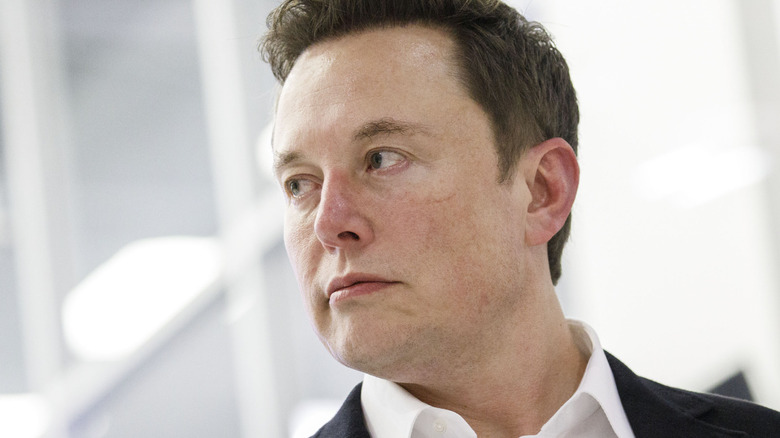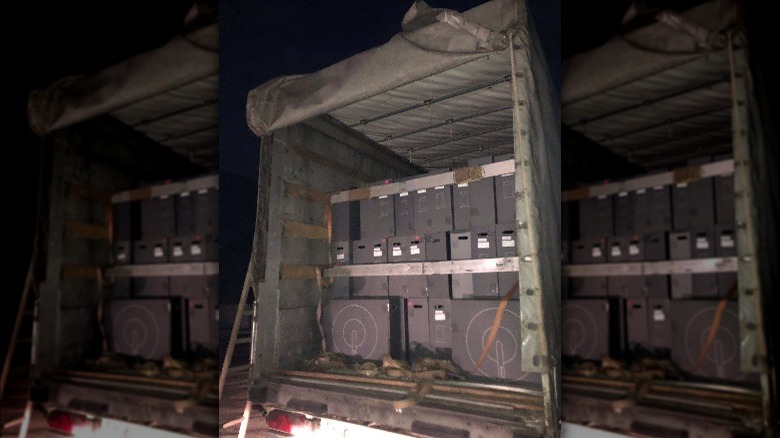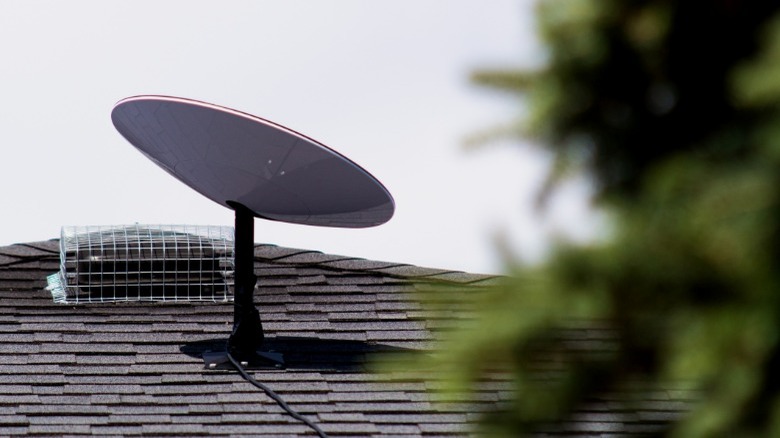Why Elon Musk Just Issued A Warning About Using Starlink
After months of building up troops along its border with Ukraine, Russian forces invaded the European nation on February 24, reigniting and escalating the conflict that began in 2014 and included Russia' annexation of the Crimean Peninsula. Two days into the assault — which Russian president Vladimir Putin is calling a "special military operation" rather than an invasion — Ukraine's vice prime minister Mykhailo Fedorov tweeted an urgent call for a very specific type of aid: he implored SpaceX CEO Elon Musk to provide his country with access to the Starlink satellite communications network in order to maintain access to the internet. "@elonmusk, while you try to colonize Mars — Russia try to occupy Ukraine!" he tweeted. "While your rockets successfully land from space — Russian rockets attack Ukrainian civil people! We ask you to provide Ukraine with Starlink stations and to address sane Russians to stand."
These pleas were not unfounded; Russia is expected to attempt to cut off Ukrainian communications in order to gain a strategic advantage, taking away internet access and creating a potential host of logistical issues in the process. SpaceX's satellite internet constellation could be a potential solution, were Russian forces able to compromise Ukraine's communications infrastructure. Musk and his company acted quickly, enabling the service in Ukraine and sending more terminals to provide internet access to a greater number of people. In response to Fedorov's request, Musk managed to deliver Starlink terminals to Ukraine within 48 hours.
However, using Starlink during times of war is not without risks, which Musk also pointed out in a March 3 tweet.
Making use of Starlink will be a risk vs. reward scenario
Ukrainian vice prime minister Mykhailo Fedorov confirmed receipt of the Starlink terminals he sought from Elon Musk, thanking the SpaceX CEO in a tweet just over two days after his initial request. Once again thanking Musk in a March 2 tweet, Fedorov shared that "Starlink keeps our cities connected and emergency services saving lives!" while also calling for generators from companies like Honda, Westinghouse, and DuroMax. According to the U.K. outlet The Guardian, Starlink is unlikely to be used by your everyday Ukrainian citizen; rather, it's likely to be reserved for strategic use by Ukrainian officials in order to maintain their access to global communications.
Unfortunately, using the satellite-based Starlink device increases the probability of being marked as a target for attack by the Russian military, which Musk pointed out in a warning to potential users. "Important warning: Starlink is the only non-Russian communications system still working in some parts of Ukraine, so probability of being targeted is high," Musk said via Twitter, imploring those with access to Starlink terminals to "Please use with caution."
He then went on to elaborate that almost all Viasat user terminals in Ukraine have been "rendered unusable" by a Russian cyberattack on the first day of the war and admitted that Starlink could meet the same fate. While a cyberattack wouldn't necessarily directly endanger the users of a Starlink terminal, it would still cut what could be a Ukrainian official's last line of communication with fellow Ukrainians and the outside world.
Using Starlink could have consequences if done so without due caution
Satellite signals can be used to target people and places in wartime, and if the Russian army catches on, Starlink users could be in danger. Assuming that the enemy is able to track down the Starlink satellite dish, it definitely puts a target on the back of the person that set up the device. Furthermore, Russian reconnaissance teams could target any visible communications equipment for destruction, increasing the danger of Starlink users being harmed in an attack. If Russia's aim is to cut Ukrainian communication as much as possible, the newly-delivered Starlink equipment will undoubtedly be a prime target.
Fortunately, Musk had some practical suggestions to go along with his warnings. He tweeted some follow-up advice for safer use of the Starlink terminals, advising users in Ukraine to only turn on their devices when absolutely necessary and to place the antenna as far away from people as possible. "Place light camouflage over antenna to avoid visual detection," Musk tweeted, advising a user who inquired about using spray paint for camouflage that it should serve as a solution, provided the paint is free of metal particles. Twitter user @RenataKonkoly followed up with a link to a recent DIY camouflage from seclists.com, with author Eric Kuhnke providing some "possibilities for making a starlink terminal much less noticeable from the air or casual observation."
While much of the recent Starlink news comes in support of maintaining Ukraine's communications capabilities, Musk recently said he'd received calls from unnamed governments to remove Russian news sources from the service and vowed not to do so "unless at gunpoint," explaining the decision by calling himself a "free speech absolutist."


